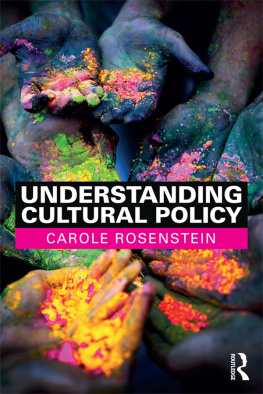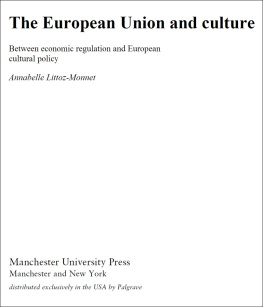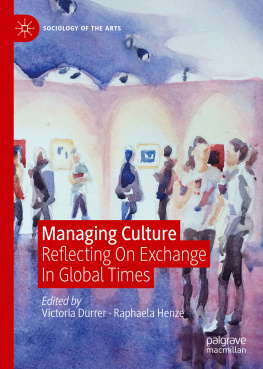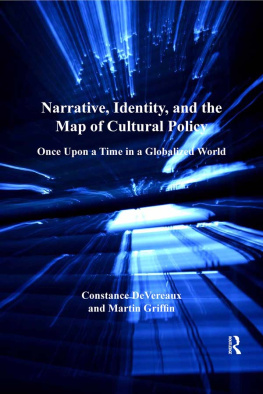Understanding Cultural Policy
Understanding Cultural Policy provides a practical, comprehensive introduction to thinking about how and why governments intervene in the arts and culture.
Cultural policy expert Carole Rosenstein examines the field through comparative, historical, and administrative lenses, while engaging directly with the issues and tensions that plague policymakers across the world, including issues of censorship, culture-led development, cultural measurement, and globalization. Several of the textbooks chapters end with a policy lab designed to help students tie theory and concepts to real world, practical applications.
This book will prove a new and valuable resource for all students of cultural policy, cultural administration, and arts management.
Carole Rosenstein is an associate professor of arts management at George Mason University, USA. She has directed research projects for the Urban Institute, the National Endowment for the Arts, and the Institute for Museum and Library Services. Her scholarly work has been published in leading international cultural policy journals including The International Journal of Cultural Policy; The Journal of Arts Management, Law and Society; and Cultural Trends.
Understanding Cultural Policy
Carole Rosenstein
First published 2018
by Routledge
711 Third Avenue, New York, NY 10017
and by Routledge
2 Park Square, Milton Park, Abingdon, Oxon, OX14 4RN
Routledge is an imprint of the Taylor & Francis Group, an informa business
2018 Taylor & Francis
The right of Carole Rosenstein to be identified as author of this work has been asserted by her in accordance with sections 77 and 78 of the Copyright, Designs and Patents Act 1988.
All rights reserved. No part of this book may be reprinted or reproduced or utilized in any form or by any electronic, mechanical, or other means, now known or hereafter invented, including photocopying and recording, or in any information storage or retrieval system, without permission in writing from the publishers.
Trademark notice: Product or corporate names may be trademarks or registered trademarks, and are used only for identification and explanation without intent to infringe.
Library of Congress Cataloging-in-Publication Data
A catalog record for this book has been requested
ISBN: 978-1-138-69533-7 (hbk)
ISBN: 978-1-138-69535-1 (pbk)
ISBN: 978-1-315-52685-0 (ebk)
Typeset in Bembo
by Apex CoVantage, LLC
For Harry
Every minute, billions of telegraph messages chatter around the world. Some are intercepted on ships. They interrupt law enforcement conferences and discussions of morality. Billions of signals rush over the ocean floor and fly above the clouds. Radio and television fill the air with sound. Satellites hurl messages thousands of miles in a matter of seconds. Today our problem is not making miraclesbut managing miracles.
Lyndon Baines Johnson, comments upon signing the Public Broadcasting Act of 1967
All the suggestions heard thus far would amount to ideas with broken wings, were it not for a bit of false logic encountered in them. One adjusts all too readily to the prevailing conviction that the categories of culture and administration must simply be accepted as that into which they actually have developed to a large degree in historical terms: as static blocks which discretely oppose each otheras mere actualities. In so doing, one remains under the spell of that reification, the criticism of which is inherent in all the more cogent reflections upon culture and administration. No matter how reified both categories are in reality, neither is totally reified; both refer back to living subjectsjust as does the most adventurous cybernetic machine.
Therefore, the spontaneous consciousness, not yet totally in the grips of reification, is still in a position to alter the function of the institution within which this consciousness expresses itself. For the present, within liberal-democratic order, the individual still has sufficient freedom within the institution and with its help to make a modest contribution to its correction. Whoever makes critically and unflinchingly conscious use of the means of administration and its institutions is still in a position to realize something which would be different from merely administrated culture. The minimal differences from the ever-constant which are open to him define for himno matter how hopelesslythe difference concerning the totality; it is, however, in the difference itselfin divergencethat hope is concentrated.
Theodore Adorno, Culture and Administration
This book is an in-depth introduction to the basic concepts, principles, workings, and functions of cultural policy in the United States. In it, I hope to provide readers with some concrete, practical knowledge about how cultural policy operates, knowledge they can use to understand and navigate on-the-ground choices and conflicts. The book includes the histories and theory of cultural policy that I believe every cultural administrator should hold in a professional repertoire. The field lacked a bespoke, synthetic work covering the historical, conceptual, and practical dimensions of cultural policy in the U.S. (This made it just about impossible to cover everything in one semester, and made for an over-long and repetitive reading list that was the bane of my students for a decade.) I have tried to build that work. The book was conceived as a primer for cultural administrators and aspiring policymakers, for those who are closely affected by cultural policy, and those who wish to intervene in cultural policymaking. I hope that it will give cultural administrators the foundation they need and will ease the future progression of students toward the advanced study of cultural policy.
This books focus on practical knowledge and its full integration of the administrative dimensions of policy distinguish it from existing approaches to cultural policy study and analysis.
The prevailing approach to policy analysis presents policy as transparently instrumental and primarily depends on economic theory and methods to understand policy. It is not the approach taken here. Instead, this book examines how cultural policy relates to history, politics, culture, and administration. I take that approach because I view policy as inextricable from the historical, political, cultural, and administrative contexts in which it is created and implemented. Even what is instrumental about policythat is, even the relatively straightforwardly goal-oriented aspects of policyare constituted in and by these contextual factors. I was trained as a cultural anthropologist, and that training shows in the way I approach the study and analysis of public policy. While economic approaches can be useful and certainly should make up a part of any analytical toolkit, I find the dominance of economic theory to be particularly unhelpful to understanding cultural policy. Public decision-making about whether, how, and how much to intervene in culture is heavily influenced by social and cultural structures and values. Economic approaches often appear driven not just to quantify value but to translate all sorts of value into quantifications realized on a monetary scale. Individual rationality is then assumed or asserted somehow to be associated with those monetary values in a necessary way, seeming to bypass social and cultural (and even economic!) structures. In my view, this does not provide a viable path toward fully understanding social and cultural values, comparing them to other sorts of value, and theorizing how those various sorts of value influence peoples preferences and the choices they make. (These limitations of economic approaches to policy analysis may apply to all sorts of policy; here, I am only concerned with cultural policy.) Some counterweight is needed, and I hope that this book can contribute to creating a better balance among the approaches taken to cultural policy analysis.







